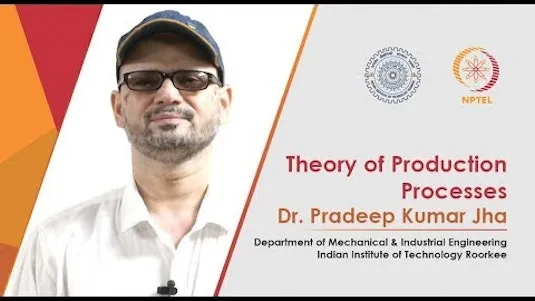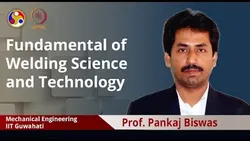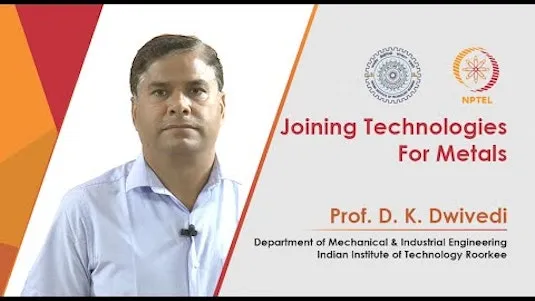
Theory Of Production Processes 
This course focuses on the science behind primary production processes such as casting, forming and welding. It covers the underlying principles of solidification, fluidity, gating, risering, melting, mechanics of metalworking, analysis of different metal working processes, principles of welding processes, thermal effects, weldability, and more. Students will gain knowledge to increase the productivity of manufacturing industries. Prerequisites include Introduction to Manufacturing Technology or Manufacturing Processes. Intended audience is Manufacturing Industries where casting/forming/welding takes place. ▼
ADVERTISEMENT
Course Feature
![]() Cost:
Cost:
Free
![]() Provider:
Provider:
Swayam
![]() Certificate:
Certificate:
Paid Certification
![]() Language:
Language:
English
![]() Start Date:
Start Date:
23rd Jul, 2023
Course Overview
❗The content presented here is sourced directly from Swayam platform. For comprehensive course details, including enrollment information, simply click on the 'Go to class' link on our website.
Updated in [May 25th, 2023]
This course, Theory of Production Processes, focuses on understanding the science behind the technology of primary production processes, such as casting, forming and welding. It is designed to provide students with an understanding of the theoretical aspects of these processes, rather than just the operational procedures. The course is divided into three sections, each of which is covered in four weeks. The first section covers the principles of solidification, fluidity, gating, risering, and melting. The second section covers the mechanics of metalworking and the analysis of different metalworking processes. The third section covers the principles of welding processes, thermal effects, and weldability. Upon completion of the course, students will have the knowledge to increase the productivity of manufacturing industries. This course is intended for those with an introduction to manufacturing technology or manufacturing processes. It is supported by manufacturing industries where casting, forming, and welding take place, such as SAIL, BHEL, HEC, and Bharat Forge.
[Applications]
The application of this course can be seen in the manufacturing industries where casting, forming and welding processes take place. The knowledge gained from this course can be used to increase the productivity of these industries in the long run. The course can also be used to help students become conversant with the working principles of these processes. Additionally, the course can be used to provide industry support to manufacturing industries such as SAIL, BHEL, HEC, Bharat Forge, etc.
[Career Paths]
1. Manufacturing Engineer: Manufacturing Engineers are responsible for designing, developing, and overseeing the production of industrial machinery, consumer products, and other items. They are also responsible for ensuring that the production process is efficient and cost-effective. With the increasing demand for new and innovative products, Manufacturing Engineers are in high demand and the job outlook is expected to remain strong.
2. Quality Control Engineer: Quality Control Engineers are responsible for ensuring that products meet the required standards of quality. They are responsible for developing and implementing quality control systems, conducting tests, and analyzing data to ensure that products meet the required standards. Quality Control Engineers are in high demand and the job outlook is expected to remain strong.
3. Process Engineer: Process Engineers are responsible for designing, developing, and optimizing production processes. They are responsible for ensuring that production processes are efficient and cost-effective. Process Engineers are in high demand and the job outlook is expected to remain strong.
4. Automation Engineer: Automation Engineers are responsible for designing, developing, and implementing automated systems for industrial and manufacturing processes. They are responsible for ensuring that automated systems are efficient and cost-effective. Automation Engineers are in high demand and the job outlook is expected to remain strong.
[Education Paths]
1. Bachelor of Science in Manufacturing Engineering: This degree program focuses on the design, development, and implementation of manufacturing processes and systems. It covers topics such as materials science, engineering design, manufacturing processes, and quality control. It also provides students with the skills to develop and manage production systems, analyze and improve production processes, and design and implement new manufacturing systems. This degree is becoming increasingly important as the manufacturing industry continues to evolve and become more complex.
2. Master of Science in Manufacturing Engineering: This degree program provides students with advanced knowledge and skills in the areas of manufacturing engineering. It covers topics such as advanced materials science, advanced engineering design, advanced manufacturing processes, and advanced quality control. It also provides students with the skills to develop and manage complex production systems, analyze and improve production processes, and design and implement new manufacturing systems. This degree is becoming increasingly important as the manufacturing industry continues to evolve and become more complex.
3. Doctor of Philosophy in Manufacturing Engineering: This degree program provides students with the highest level of knowledge and skills in the areas of manufacturing engineering. It covers topics such as advanced materials science, advanced engineering design, advanced manufacturing processes, and advanced quality control. It also provides students with the skills to develop and manage complex production systems, analyze and improve production processes, and design and implement new manufacturing systems. This degree is becoming increasingly important as the manufacturing industry continues to evolve and become more complex.
4. Master of Business Administration in Manufacturing: This degree program provides students with the knowledge and skills to manage and lead manufacturing operations. It covers topics such as operations management, supply chain management, and quality management. It also provides students with the skills to develop and manage production systems, analyze and improve production processes, and design and implement new manufacturing systems. This degree is becoming increasingly important as the manufacturing industry continues to evolve and become more complex.
Course Provider

Provider Swayam's Stats at AZClass
Discussion and Reviews
0.0 (Based on 0 reviews)
Explore Similar Online Courses

Build a REST API with Laravel Course

College Composition

Python for Informatics: Exploring Information

Social Network Analysis

Introduction to Systematic Review and Meta-Analysis

The Analytics Edge

DCO042 - Python For Informatics

Causal Diagrams: Draw Your Assumptions Before Your Conclusions

Whole genome sequencing of bacterial genomes - tools and applications

Welding Safety

Fundamental of Welding Science and Technology


Start your review of Theory Of Production Processes